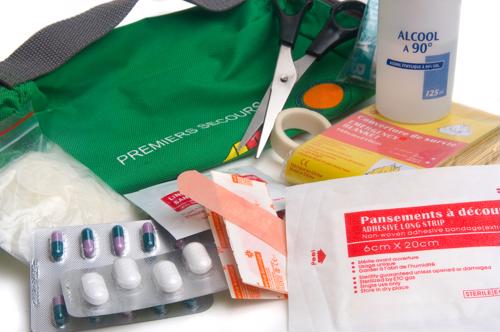When the cut, scrape, blister or bleeding happens, you don’t want to be stuck running in a panicked frenzy to the closest drug store. Instead, be prepared for common injuries, symptoms and ailments with a well-stocked medicine cabinet and home first aid kit.
Here are the essential wound care supplies you should have on hand at home:
 Make sure your home first aid kit is well stocked.
Make sure your home first aid kit is well stocked.For cuts and scrapes:
The basic must-haves for these minor wounds include:
- Adhesive bandages in various sizes.
- Sterile gauze pads.
- Medical tape.
- Antibiotic ointment.
The size of the wound will help you determine whether a bandage will suffice or if gauze and tape will be more effective, so it’s a smart idea to have both in your home first aid kit. Cleanse wounds with soap and warm water, apply the antibiotic ointment to prevent infection and then apply a clean bandage.
For burns:
You can soothe minor burn wounds with these supplies:
- Cold compress.
- Antibiotic ointment or cream.
- Aloe Vera gel.
- Sterile gauze.
- Medical tape.
Note that gauze is generally better for burn wounds as the sticky adhesive of bandages can irritate the skin. Added to that, you can apply the gauze loosely so the affected area is protected from exposure but the tight, hot skin isn’t too restricted.
For stings and rashes:
The Cleveland Clinic suggested the following supplies to soothe this kind of skin irritation:
- Calamine lotion.
- Hydrocortisone cream, ointment or lotion.
If you or someone in your household is prone to allergic reactions, you’ll also want to have the appropriate oral antihistamines on hand to treat hives, itching and other symptoms.
For pain relief:
Pain is one of the most common symptoms of wounds. You can alleviate the discomfort with pain relievers, such as:
- Aspirin.
- Acetaminophen, such as Tylenol.
- Ibuprofen, such as Advil or Motrin.
- Heat and ice packs.
Safety tip from the Mayo Clinic: Never give aspirin to children.
For extra prep:
The Mayo Clinic advised filling your home first aid kit with these additional wound care supplies:
- Scissors.
- Tweezers.
- Thermometer.
- Cotton balls.
- Cotton-tipped swabs.
- Disposable non-latex gloves.
- Hand sanitizer.
- Safety pins in various sizes.
For more serious wounds:
While these supplies will help you treat minor wounds, more serious injuries will require medical attention. For instance, infections, chronic wounds and ulcers may need more specific wound care supplies than your medicine cabinet can supply.
Talk to your doctor about iPak unit dose packaging from Innovative Outcomes, to get your prescribed wound care supplies delivered straight to your front door. Complete with single-dose packaging and video tutorials, iPak makes it easy to practice proper at-home wound care.





